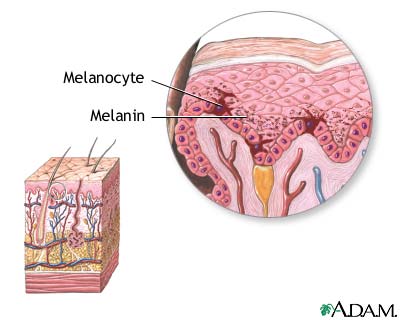Symptoms & Signs
A person with albinism will have one of the following symptoms:
* Absence of color in the hair, skin, or iris of the eye
* Lighter than normal skin and hair
* Patchy, missing skin color

Many forms of albinism are associated with the following symptoms:
* Crossed eyes (strabismus)
* Light sensitivity (photophobia)
* Rapid eye movements (nystagmus)
* Vision problems, or functional blindness
Diagnosis & Tests
Genetic testing offers the most accurate way to diagnose albinism. Such testing is helpful if you have a family history of albinism. It is also useful for certain groups of people who are known to get the disease.
Your doctor may also diagnose the condition based on the appearance of your skin, hair, and eyes. An ophthalmologist should perform a electroretinogram test, which can reveal vision problems related to albinism. A visual evoked potentials test can be very useful when the diagnosis is uncertain.
Albinism: Overview, Causes
Albinism: Symptoms & Signs, Diagnosis & Tests
Albinism: Treatment
Reviewed By : Luc Jasmin, MD, PhD, Departments of Anatomy and Neurological Surgery, University of California, San Francisco, CA. Review provided by VeriMed Healthcare Network. Also reviewed by David Zieve, MD, MHA, Medical Director, A.D.A.M., Inc.
